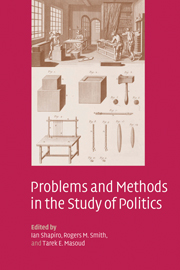Book contents
- Frontmatter
- Contents
- List of contributors
- Acknowledgments
- 1 Introduction: problems and methods in the study of politics
- Part I Description, explanation, and agency
- Part II Redeeming rational choice theory?
- Part III Possibilities for pluralism and convergence
- 12 The illusion of learning from observational research
- 13 Concepts and commitments in the study of democracy
- 14 Problems chasing methods or methods chasing problems? Research communities, constrained pluralism, and the role of eclecticism
- 15 Method, problem, faith
- 16 Provisionalism in the study of politics
- 17 What have we learned?
- Index
- References
13 - Concepts and commitments in the study of democracy
Published online by Cambridge University Press: 22 September 2009
- Frontmatter
- Contents
- List of contributors
- Acknowledgments
- 1 Introduction: problems and methods in the study of politics
- Part I Description, explanation, and agency
- Part II Redeeming rational choice theory?
- Part III Possibilities for pluralism and convergence
- 12 The illusion of learning from observational research
- 13 Concepts and commitments in the study of democracy
- 14 Problems chasing methods or methods chasing problems? Research communities, constrained pluralism, and the role of eclecticism
- 15 Method, problem, faith
- 16 Provisionalism in the study of politics
- 17 What have we learned?
- Index
- References
Summary
Introduction
This chapter imagines a conversation among three different communities of scholarship on democracy. One approach, what we might call scientific studies of political economy, tends to explore the relationship between economic development and democracy (or sometimes more broadly, regime type); it uses formal theoretical models combined with statistical ones for empirical testing in an effort to come up with law-like rules or patterns governing political behavior. Another approach, framed by an interpretive, philosophical commitment to understanding the relationship between words and politics, examines the conceptual conundrums and meanings associated with words such as democracy. Still another approach, also termed “interpretive,” investigates the substantive activities undertaken by individuals and/or groups comprising the political order – the everyday practices and systems of signification associated with democracy in particular places. Each is dedicated to solving problems of abiding relevance to empirical politics, and each employs one or more methods to do so. Yet the kinds of questions, the terms of debate, the definition of democracy, the importance of science, the role methods play, and the underlying epistemological commitments animating each differ in critical and recognizable ways. This chapter considers the questions that are enabled or foreclosed in opting for one approach over the other. It asks: what are the scholarly and political stakes involved in thinking about democracy in ways that emphasize scientific methods or that tackle long-standing theoretical confusions?
Information
- Type
- Chapter
- Information
- Problems and Methods in the Study of Politics , pp. 274 - 306Publisher: Cambridge University PressPrint publication year: 2004
References
Accessibility standard: Unknown
Why this information is here
This section outlines the accessibility features of this content - including support for screen readers, full keyboard navigation and high-contrast display options. This may not be relevant for you.Accessibility Information
- 14
- Cited by
